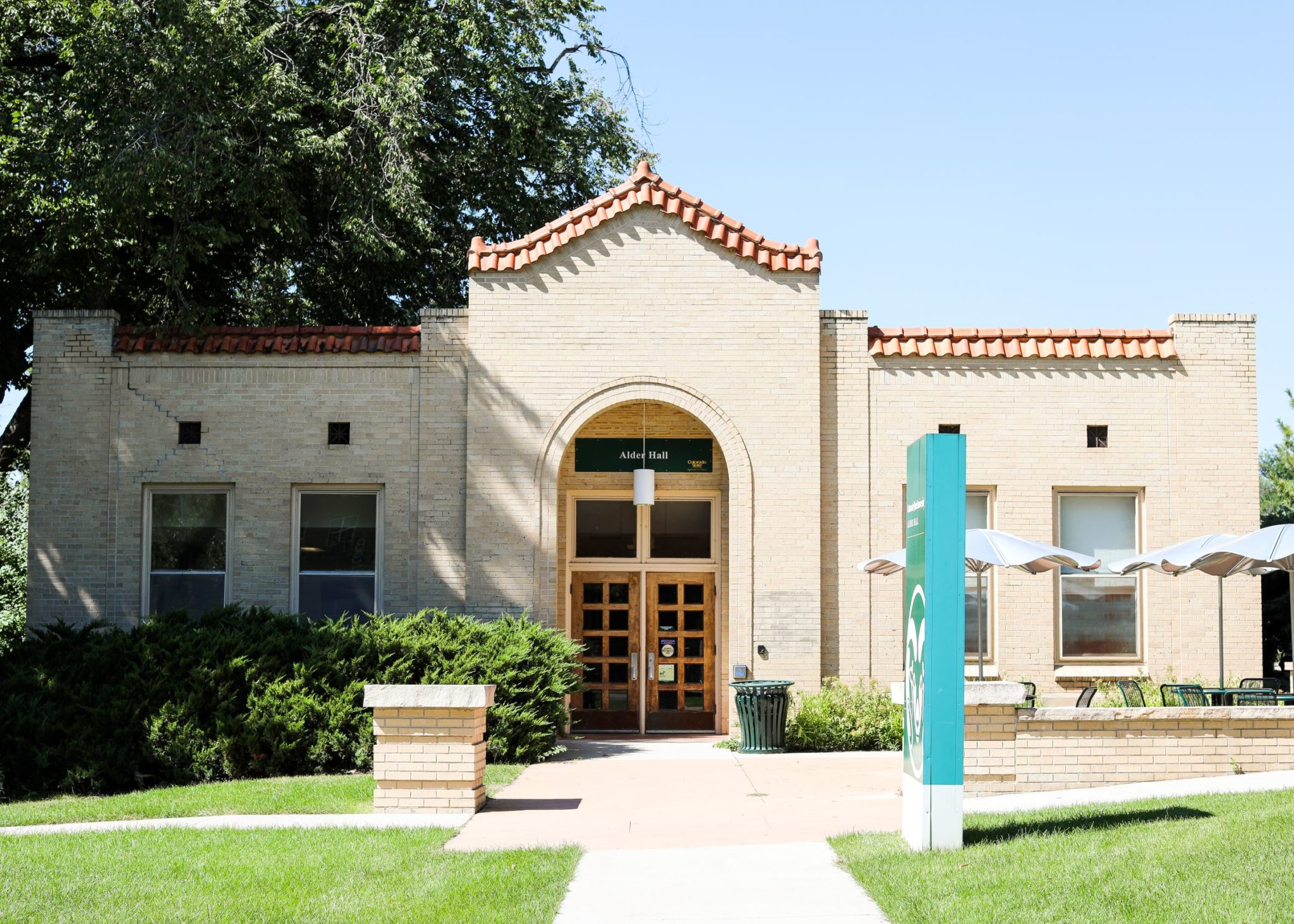
On the east side of Colorado State University’s campus, Alder Hall is home to four centers that have far-reaching community impacts for individuals, families, schools, equity, and health. The Center for Community Partnerships, the Prevention Research Center, the Human-Animal Bond in Colorado (HABIC) Center, and the Social Work Research Center each has a targeted approach with evidence-based practices sharing a common mission to improve lives.
All community members are invited to connect with the centers at An Afternoon at Alder Hall, an open house event on Wednesday, May 17, 4-6 p.m. at 850 S. Mason St. in Fort Collins. Open doors, lively conversations, and complimentary food truck fare will welcome visitors. Registration is recommended. Free parking is available in campus parking lots beginning at 4 p.m.
College of Health and Human Sciences Dean Lise Youngblade, leaders of each center, program participants, researchers, and students will highlight the roles these centers play in the community, and ways others can get involved. Attendees can engage with each center through brief remarks at 4:15 p.m., videos, research posters, and facility tours. Read on to learn about each center.
Center for Community Partnerships
An outreach center in the Department of Occupational Therapy, the Center for Community Partnerships helps individuals overcome challenges related to school, work, sleep, and independent living. The mission of CCP is to support the inherent dignity, potential, and full participation of people.
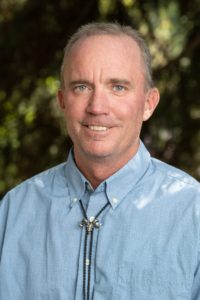
For more than 30 years, CCP has offered a variety of programs for CSU students and community members, including student-veterans, people with disabilities, neurodiverse individuals, and people with chronic insomnia. CCP offers a unique blend of structured programs with partners like the Division of Vocational Rehabilitation and individualized support attuned to each person’s unique circumstances and goals. CCP connects people with resources and empowers self-advocacy.
CCP staff will be available during the Afternoon at Alder to provide information about the range of services its team offers the Northern Colorado community, the individuals who benefit, and to discuss opportunities for collaboration.
“Our team works to break barriers to access and full inclusion in higher education, employment, independent living, and the community,” said James Graham, director. “We support individuals by identifying and using strategies that help them, help themselves to achieve their personal goals.”
Prevention Research Center
Part of the Department of Human Development and Family Studies, the Prevention Research Center promotes health and well-being throughout the lifespan. Established in 2014, the PRC is a campuswide, trans-disciplinary center committed to studying the development, implementation, and evaluation of effective and sustainable intervention programs that promote individual and family health and wellness throughout the lifespan. The PRC programs also aim to reduce the risk for problems such as substance misuse, physical and mental health issues, violence, and problems of aging.
Substance use, mental health problems, and suicide affect one-quarter of all Coloradoans. At the open house, the Prevention Research Center team will showcase how they address these societal challenges through engaged community-based research and hands-on training opportunities.
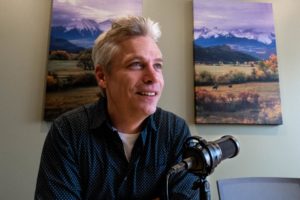
“We support communities in their use of evidence-based strategies that reduce risk factors and enhance protective factors to improve the health and wellbeing of individuals, families, and communities,” explained Nathaniel Riggs, PRC executive director.
The PRC conducts rigorous and innovative prevention science research and provides training for the next generation of prevention scientists and community prevention practitioners. The team engages community organizations to implement and test new interventions designed to build health and prevent problems for individuals and families across the lifespan.
Human-Animal Bond in Colorado (HABIC) Center
The HABIC Center, part of CSU’s School of Social Work, sponsors animal therapy programs, education, and research to explore and advance the benefits of the human-animal bond. The HABIC Center is celebrating its 30th anniversary this year.
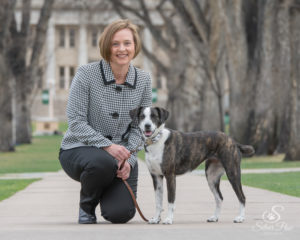
“The HABIC Center trains and sponsors volunteer animal therapy dog and cat teams who provide goal-directed human-animal interventions to help build trust, strengthen relationships, and make a difference for others,” said Helen Holmquist-Johnson, executive director of The HABIC Center.
“During the Afternoon at Alder Hall event, we’re looking forward to sharing information about how human-animal interactions facilitate the therapeutic process in hospitals, schools, assisted living facilities, and more places,” Holmquist-Johnson said, “and support the health and mental health of individuals, families, and communities.”
The HABIC Center offers a graduate certificate, Social Aspects of Human-Animal Interactions, through CSU Online. Students explore our relationship with companion animals, prepare to conduct animal-assisted interventions, and learn to provide support to animal caregivers such as veterinary professionals and animal shelter workers. In addition, The HABIC Center provides opportunities for student employment, internships, and volunteer roles for CSU students.
The HABIC Center conducts and supports ongoing research in the field of human-animal interaction, including evaluating outcomes of animal-assisted interventions. Current funded projects support interdisciplinary team research to better understand the impacts of human-animal interaction on both human health and mental health.
Social Work Research Center
The Social Work Research Center (SWRC) is in the School of Social Work. Established in 2004, SWRC promotes evidence-based research, practice, and policy in the child maltreatment prevention, family strengthening, child/youth well-being, and juvenile justice domains.
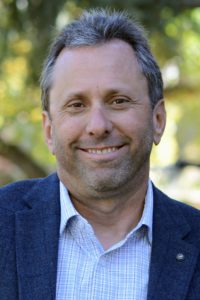
“We engage in team-based science to innovate new directions in research and evaluation that are responsive, meaningful, family-engaged, and community-centered,” said Marc Winokur, SWRC director. “Our team is comprised of interdisciplinary scholars from education, social work, sociology, public health, and statistical sciences. We also provide opportunities for students to participate in all aspects of social work research.”
At the open house, SWRC staff will present posters with findings from recent research projects and will be available to discuss other opportunities for research and evaluation collaboration.
Students at the BSW, MSW, and Ph.D. levels have been supported with internships and research assistantships at SWRC. The work they do has a multiplier effect. “Over the past 19 years, SWRC’s research partnerships have led the way for practice shifts in Colorado and nationally,” said Marc Winokur. “We are proud to have longstanding collaborations with community-based organizations; inter-university centers; and county, state, and federal agencies.”
The Department of Human Development and Family Studies, the Department of Occupational Therapy, and the School of Social Work are a part of CSU’s College of Health and Human Sciences.